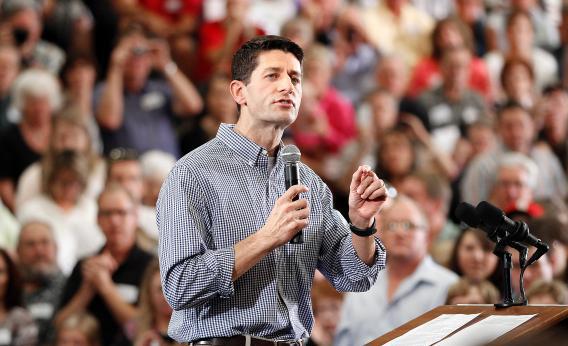Is there no way to stop Republicans from pretending to be Ronald Reagan? One of the most painful and least valid aspects of the introduction of Rep. Paul Ryan as Mitt Romney’s running mate has been the clumsy but predictable effort to don “the mantle of Reagan.”*** Can we retire the man’s coat, already? If there is one thing that is clear about the modern Republican Party it is that none of the characters who have shuffled on and off its “frontrunner” list in this cycle have the shoulders for that garment.
Certainly not Mitt Romney. In spite of the historical revisionism about The Gipper since his death, he was neither Rambo nor a man who refused to raise taxes. Reagan was a conciliator, and his leadership style was practical even when his rhetoric was overblown. And Reagan was a creature of the midwestern middle class – the kind of guy whose “mantle” would be a “respectable Republican cloth coat,” as Richard Nixon described it so many years ago. Mitt’s bespoke silk-lined wardrobe hardly fits that humble standard.
Enter Paul Ryan, legitimately a son of the Midwest and of America’s middle class. Back in May, with a speech at the Reagan Presidential Library, he placed his own bid on the Ronald’s Technicolor Dreamcoat, promising that if Mitt Romney won in November, the GOP would turn 2013 into 1981 all over again.
“Romney Ratifies Reagan with Ryan Pick,” intoned Fox News.
With Romney offering so little detail on his own budget priorities to date, one has to assume at this point – whatever Romney may say to the contrary – that the that the budget Ryan championed as House Budget Chairman first in 2011 and then again earlier this year represents the campaign’s baseline at the moment.
So, if a Romney-Ryan ticket were to win, would an effort to ram the Ryan budget through Congress in 2013 satisfy the most important litmus test of the modern GOP: “What Would Reagan Do?
Set aside the question of whether the 1981/2013 comparison is valid or not (the case is dubious at best) and let’s look at what Reagan actually did when he took office. In fact, rather than attack government spending with the Sword of Damocles, or even the Pen of Ryan, as the sepia-toned remembrances of party lore, Reagan actually worked quite deftly with a Congress in which Democrats held power in both chambers.
Faced with a difficult economy and divided government, Reagan chose to mix tax cuts with stimulus spending and, yes, tax increases, too. Bruce Bartlett, an economic advisor to Reagan and a Treasury official under George H. W. Bush, professes amazement at the twisting of the historical record by those too young to remember the factual Reagan (as opposed to the guy in the red cape).
As I wrote in my book earlier this year, Bartlett reminds us, “The cumulative legislated tax increase during his administration came to $132.7 billion as of 1988 [$367 billion today]. This compared to a gross tax cut of $275.1 billion. Thus Reagan took back about half the 1981 tax cut with subsequent tax increases.”
Indeed, David Stockman, Reagan’s budget cutting OMB director denounced Ryan’s numbers as a “fairy tale” this week.
Imagine that! The alleged God of Tax Cuts actually raised taxes when he thought progress, political, economic or otherwise, required him to do so.
Fat chance we’ll see a Romney White House governing so practically. Certainly, that would not be the approach favored by Ryan. And most certainly, the House GOP – assuming as I do it remains a stronghold of the Tea Party – would never allow it. Reagan would have been denounced as a traitor, or a socialist or worse. (Was he really born in Illinois? And what about that nickname – Dutch! We better check the birth certificate).
Sadly, many Democrats, too, prefer fantasy to fact—though perhaps more as political strategy than economic concept. Back when Paul Ryan first appeared on the scene, in early 2011, Democrats completely abandoned any effort to put Medicare’s trust fund on a sustainable course when polls revealed that Ryan’s proposal to reform it was political poison. Talk of compromise on this vital topic was replaced by tongue-in-cheek bumper stickers like Vote Republican, End Medicare.
Once again, one of our two parties confused partisan interest with national interest. While Ryan’s plan does indeed ultimately end Medicare in its current form and represents a radical view, it could have also been the basis for a real discussion of how to save Medicare. No one should operate under the illusion that the program—or, for that matter, Social Security and Medicaid—can continue unreformed without destroying the US economy’s ability to grow. But politics, even two years before the 2012 presidential election, won the day.
Today, Medicare looks even less sustainable than it did in 2012. What’s the Democratic plan for saving it? So far, it seems like the plan is to confine any sentient conversation to two syllables so that Florida newspapers can write good headlines. If you wonder why American voters seem to be veering from right to left and back again in one election after another, this is part of it: “Victory” to both parties is identified in terms of votes rather than what is good for the United States and its citizens. What a shame its citizens aren’t just a bit harder to fool.
—
***An entertaining way to spend a few moments is to Google “mantle of Reagan.” The usual suspects struggling to don it, of course, but also some real laughers.
